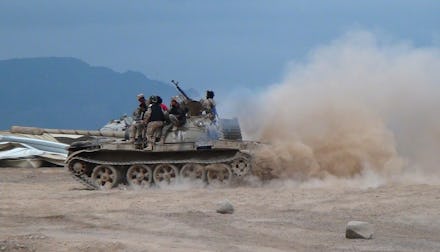Advancing Shiite Rebels Just Brought Yemen One Step Closer to Civil War

Shiite rebels in Yemen seized Aden's airport early Wednesday, as they close in on the southern port city and the country's economic hub.
This is the largest-scale attack committed by the rebel group Houthi, which also captured the capital, Sanaa, last September. The rebels are backed by ousted president Ali Abdullah Saleh; just hours after rebels captured the airport, current Yemen president Abed Rabbo Mansour Hadi fled Yemen via boat, buttressing Houthi's grip on the country.
This attack is a big deal. First, it could signal the escalation of a civil war. According to a reporter in the region who spoke to Mic under the condition of anonymity out of concern for his job, Yemen has been internally fighting a war for a while now: "The minute the rebels seized the capital, it was pretty clear Yemen was in the midst of a civil war."
Second, the advances on Aden triggered airstrikes from Saudi Arabia, which has been building up a military presence on its border with Yemen for some time. Saudi's Sunni regime opposes the Yemeni Shiite rebels.
Meanwhile, some fear the recent upheaval and subsequent military activity by Saudi Arabia could prompt Iran to get involved. While Houthi rebels deny any links to the Shiite country, it is increasingly apparent that Iran has been supporting the group.
What does this mean for the US? Instability in the Middle East invariably drains America of its resources. Whether it's airstrikes in Libya (and the subsequent fallout), airstrikes against Islamic State or boots on the ground in Iraq. The U.S. has many reasons to remain involved in regional conflict — including access to natural resources and maintaining political allies — and this is unlikely to change.
If Yemen descends into chaos and brings our Saudi frenemy and Irani enemy with it, there'll be a lot more to resolve than simply restoring internal stability. The much-publicized nuclear deal with Iran could dissolve and our complicated alliance with oil-rich Saudi Arabia could become even shakier.
The only thing we can be certain of is it's too precarious and volatile to know which direction this will go.